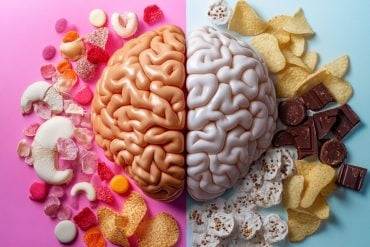Summary: A recent study reveals that everyday pleasures like music and coffee can significantly enhance cognitive performance.
Utilizing groundbreaking brain-monitoring technology, the study examined brain activity during cognitive tests under various stimulants, including music, coffee, and perfume. Results indicated increased “beta band” brain wave activity, linked to peak cognitive performance, when subjects engaged with music or consumed coffee.
AI-generated music, in particular, showed significant performance boosts, opening new avenues for exploration.
Key Facts:
- The MINDWATCH algorithm indicates that music and coffee can alter brain arousal, promoting improved cognitive performance.
- Listening to AI-generated music yielded the most significant performance gains among tested stimulants.
- The MINDWATCH technology aims to monitor cognitive arousal in real-time, suggesting interventions like music listening during moments of acute stress.
Source: NYU
Listening to music and drinking coffee are the sorts of everyday pleasures that can impact a person’s brain activity in ways that improve cognitive performance, including in tasks requiring concentration and memory.
That’s a finding of a new NYU Tandon School of Engineering study involving MINDWATCH, a groundbreaking brain-monitoring technology.

Developed over the past six years by NYU Tandon’s Biomedical Engineering Associate Professor Rose Faghih, MINDWATCH is an algorithm that analyzes a person’s brain activity from data collected via any wearable device that can monitor electrodermal activity (EDA). This activity reflects changes in electrical conductance triggered by emotional stress, linked to sweat responses.
In this recent MINDWATCH study, published in Nature Scientific Reports, subjects wearing skin-monitoring wristbands and brain monitoring headbands completed cognitive tests while listening to music, drinking coffee and sniffing perfumes reflecting their individual preferences. They also completed those tests without any of those stimulants.
The MINDWATCH algorithm revealed that music and coffee measurably altered subjects’ brain arousal, essentially putting them in a physiological “state of mind” that could modulate their performance in the working memory tasks they were performing.
Specifically, MINDWATCH determined the stimulants triggered increased “beta band” brain wave activity, a state associated with peak cognitive performance. Perfume had a modest positive effect as well, suggesting the need for further study.
“The pandemic has impacted the mental well-being of many people across the globe, and now more than ever, there is a need to seamlessly monitor the negative impact of everyday stressors on one’s cognitive function,” said Faghih.
“Right now MINDWATCH is still under development, but our eventual goal is that it will contribute to technology that could allow any person to monitor his or her own brain cognitive arousal in real time, detecting moments of acute stress or cognitive disengagement, for example.
“At those times, MINDWATCH could ‘nudge’ a person towards simple and safe interventions—perhaps listening to music—so they could get themselves into a brain state in which they feel better and perform job or school tasks more successfully.”
The specific cognitive test used in this study—a working memory task, called the n-back test—involves presenting a sequence of stimuli (in this case, images or sounds) one by one and asking the subject to indicate whether the current stimulus matches the one presented “n” items back in the sequence.
This study employed a 1-back test—the participant responded “yes” when the current stimulus is the same as the one presented one item back—and a more challenging 3-back test, asking the same for three items back.
Researchers tested three types of music—energetic and relaxing music familiar to the subject, as well as novel AI-generated music that reflected the subject’s tastes.
Consistent with prior MINDWATCH research, familiar energetic music delivered bigger performance gains—as measured by reaction times and correct answers—than relaxing music.
While AI-generated music produced the biggest gains among all three, further research is needed to confirm those results.
Drinking coffee led to notable but less-pronounced performance gains than music, and perfume had the most modest gains.
Performance gains under all stimulations tended to be higher on the 3-back tests, suggesting interventions may have the most profound effect when “cognitive load” is higher.
Ongoing experimentation by the MINDWATCH team will confirm the efficacy of the technology’s ability to monitor brain activity consistently, and the general success of various interventions in modulating that brain activity.
Determining a category of generally successful interventions does not mean that any individual person will find it works for them.
The research was performed as a part of Faghih’s work on the Multimodal Intelligent Noninvasive brain state Decoder for Wearable AdapTive Closed-loop arcHitectures (MINDWATCH) project.
The study’s diverse dataset is available to researchers, allowing additional research on the use of the safe interventions in this study to modulate brain cognitive states.
Faghih served as the senior author for this paper. Its first author is Hamid Fekri Azgomi, who earned his Ph.D. under Faghih and is now a postdoctoral scholar of neurological surgery at the University of California San Francisco School of Medicine.
About this music, cognition, and coffee research news
Author: Rose Faghih
Source: NYU
Contact: Rose Faghih – NYU
Image: The image is credited to Neuroscience News
Original Research: Open access.
“Regulation of brain cognitive states through auditory, gustatory, and olfactory stimulation with wearable monitoring” by Rose Faghih et al. Scientific Reports
Abstract
Regulation of brain cognitive states through auditory, gustatory, and olfactory stimulation with wearable monitoring
Inspired by advances in wearable technologies, we design and perform human-subject experiments. We aim to investigate the effects of applying safe actuation (i.e., auditory, gustatory, and olfactory) for the purpose of regulating cognitive arousal and enhancing the performance states.
In two proposed experiments, subjects are asked to perform a working memory experiment called n-back tasks. Next, we incorporate listening to different types of music, drinking coffee, and smelling perfume as safe actuators.
We employ signal processing methods to seamlessly infer participants’ brain cognitive states.
The results demonstrate the effectiveness of the proposed safe actuation in regulating the arousal state and enhancing performance levels. Employing only wearable devices for human monitoring and using safe actuation intervention are the key components of the proposed experiments.
Our dataset fills the existing gap of the lack of publicly available datasets for the self-management of internal brain states using wearable devices and safe everyday actuators. This dataset enables further machine learning and system identification investigations to facilitate future smart work environments.
This would lead us to the ultimate idea of developing practical automated personalized closed-loop architectures for managing internal brain states and enhancing the quality of life.






